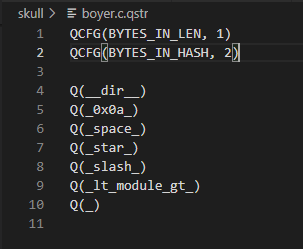【MicroPython】生成Q(string)符号表文件 - py\makeqstrdefs.py
- 脚本使用格式
python py/makeqstrdefs.py [command] [mode] [input-file] [output-directory] [output-file]
command: pp, split, cat
mode: qstr, compress
- 输入选项解析
if __name__ == "__main__": if len(sys.argv) < 6: print("usage: %s command mode input_filename output_dir output_file" % sys.argv[0]) sys.exit(2) class Args: pass args = Args() args.command = sys.argv[1] if args.command == "pp": # 创建字典 {k:v,} named_args = { s: [] for s in [ "pp", "output", "cflags", "cxxflags", "sources", "changed_sources", "dependencies", ] } # 向字典k中追加v for arg in sys.argv[1:]: if arg in named_args: current_tok = arg else: named_args[current_tok].append(arg) if not named_args["pp"] or len(named_args["output"]) != 1: print("usage: %s %s ..." % (sys.argv[0], " ... ".join(named_args))) sys.exit(2) for k, v in named_args.items(): # 构建类对象args setattr(args, k, v) preprocess() sys.exit(0)
- 文件预处理
def preprocess(): # 选择源文件列表 # 遍历列表args.changed_sources元素检查是否在列表args.dependencies中 if any(src in args.dependencies for src in args.changed_sources): sources = args.sources elif any(args.changed_sources): sources = args.changed_sources else: sources = args.sources csources = [] cxxsources = [] # 归类收集文件 for source in sources: if is_cxx_source(source): cxxsources.append(source) elif is_c_source(source): csources.append(source) try: os.makedirs(os.path.dirname(args.output[0])) except OSError: pass def pp(flags): def run(files): return subprocess.check_output(args.pp + flags + files) return run try: cpus = multiprocessing.cpu_count() except NotImplementedError: cpus = 1 p = multiprocessing.dummy.Pool(cpus) with open(args.output[0], "wb") as out_file: for flags, sources in ( (args.cflags, csources), (args.cxxflags, cxxsources), ): batch_size = (len(sources) + cpus - 1) // cpus chunks = [sources[i : i + batch_size] for i in range(0, len(sources), batch_size or 1)] for output in p.imap(pp(flags), chunks): out_file.write(output)
- 提取MP_QSTR_开头的字符串转换成Q(string)形式
def write_out(fname, output): if output: for m, r in [("/", "__"), ("\\", "__"), (":", "@"), ("..", "@@")]: fname = fname.replace(m, r) with open(args.output_dir + "/" + fname + "." + args.mode, "w") as f: f.write("\n".join(output) + "\n") def process_file(f): re_line = re.compile(r"#[line]*\s\d+\s\"([^\"]+)\"") if args.mode == _MODE_QSTR: re_match = re.compile(r"MP_QSTR_[_a-zA-Z0-9]+") elif args.mode == _MODE_COMPRESS: re_match = re.compile(r'MP_COMPRESSED_ROM_TEXT\("([^"]*)"\)') output = [] last_fname = None for line in f: if line.isspace(): continue # match gcc-like output (# n "file") and msvc-like output (#line n "file") if line.startswith(("# ", "#line")): m = re_line.match(line) assert m is not None fname = m.group(1) if not is_c_source(fname) and not is_cxx_source(fname): continue if fname != last_fname: write_out(last_fname, output) output = [] last_fname = fname continue # 新增非"#","#line"时使用给定的输出文件名 else: last_fname = args.output_file for match in re_match.findall(line): if args.mode == _MODE_QSTR: name = match.replace("MP_QSTR_", "") output.append("Q(" + name + ")") elif args.mode == _MODE_COMPRESS: output.append(match) if last_fname: write_out(last_fname, output) return ""
$ python py/makeqstrdefs.py split "qstr" test.c skull boyer.c

- 为了能供脚本py\makeqstrdata.py使用,需增加QCFG配置

def cat_together(): import glob import hashlib # 构建MD5算法的hashlib对象 hasher = hashlib.md5() all_lines = [] outf = open(args.output_dir + "/out", "wb") # glob查找文件 for fname in glob.glob(args.output_dir + "/*." + args.mode): with open(fname, "rb") as f: lines = f.readlines() all_lines += lines # 排序 all_lines.sort() # 换行转换原来字符串 all_lines = b"\n".join(all_lines) outf.write(all_lines) outf.close() hasher.update(all_lines) # hash值十六进制输出 new_hash = hasher.hexdigest() # print(new_hash) old_hash = None try: with open(args.output_file + ".hash") as f: old_hash = f.read() except IOError: pass mode_full = "QSTR" if args.mode == _MODE_COMPRESS: mode_full = "Compressed data" if old_hash != new_hash: print(mode_full, "updated") try: # rename below might fail if file exists os.remove(args.output_file) except: pass os.rename(args.output_dir + "/out", args.output_file) with open(args.output_file + ".hash", "w") as f: f.write(new_hash) else: print(mode_full, "not updated")
$ python py/makeqstrdefs.py cat "qstr" test.c skull boyer.c

再牛逼的梦想也架不住傻逼似的坚持
分类:
MicroPython





【推荐】国内首个AI IDE,深度理解中文开发场景,立即下载体验Trae
【推荐】编程新体验,更懂你的AI,立即体验豆包MarsCode编程助手
【推荐】抖音旗下AI助手豆包,你的智能百科全书,全免费不限次数
【推荐】轻量又高性能的 SSH 工具 IShell:AI 加持,快人一步
· 阿里最新开源QwQ-32B,效果媲美deepseek-r1满血版,部署成本又又又降低了!
· 开源Multi-agent AI智能体框架aevatar.ai,欢迎大家贡献代码
· Manus重磅发布:全球首款通用AI代理技术深度解析与实战指南
· 被坑几百块钱后,我竟然真的恢复了删除的微信聊天记录!
· 没有Manus邀请码?试试免邀请码的MGX或者开源的OpenManus吧
2018-05-06 【rt-thread】内核位图调度算法分析